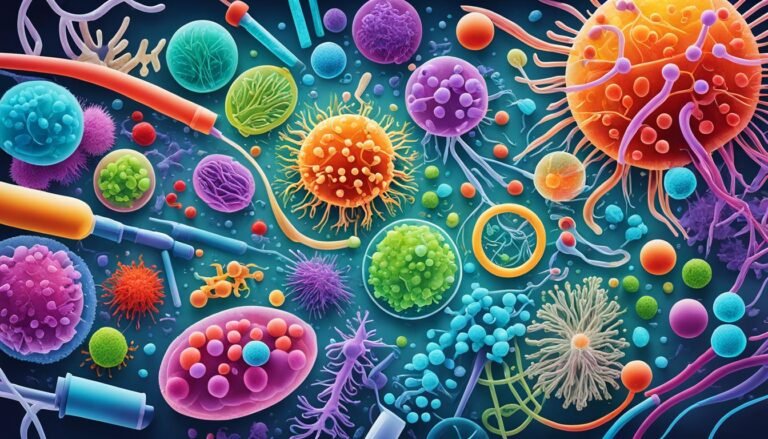What is a PhD in Biology?
Are you intrigued by life’s details and eager to unveil nature’s secrets? Have you thought about working towards a PhD in Biology? This exploration deciphers what this academic journey involves.
A PhD in Biology is like a key. It unlocks doors to discovery and innovation in science. This degree lets you dive into research with passion, leading to a rewarding career in teaching, research, or related fields.
But, what’s the journey like? Let’s uncover the adventure!
Key Takeaways:
- A PhD in Biology is a doctoral degree that offers advanced study and research opportunities in the field of life sciences.
- Graduates of a Biology PhD program can pursue various career paths in academia, research, and related industries.
- The program allows specialization in diverse areas, such as cellular and molecular biology, computational biology, ecology, and genetic epidemiology.
- Biology PhD programs offer interdisciplinary coursework and access to state-of-the-art research centers and facilities.
- To complete the program, students must fulfill requirements including a preliminary examination, dissertation research, and a final dissertation defense.
Opportunities and Career Pathways
After earning a PhD in Biology, many doors open for graduates. They can look into postdoctoral jobs. These roles mean working on research projects with other scientists. It happens in academic and research settings.
If they prefer teaching, becoming a professor is a good fit. This role mixes teaching with university-level research.
The biotechnology field is another path. It lets them apply their biology skills in interesting ways. For example, they might work on new drugs or improve medical equipment. Tissue engineering and medical devices are part of bioengineering. Here, they can help create health-enhancing products.
Then there’s the healthcare sector. It includes areas like medical research and helping to run drug tests. Consulting for healthcare is an option, too. In the world of pharmaceutics, graduates can be involved in drug and therapy research and testing.
Career Pathways for Biology PhD Graduates:
- Postdoctoral positions in Biology
- Academic positions in Biology
- Biotechnology industry careers
- Bioengineering industry careers
- Healthcare industry careers
- Pharmaceutics industry careers
Biology PhD holders can pick from various exciting careers. They might want to dive deep into research or guide future scientists. Or, they could help create new technologies from biology. There are so many ways to make a difference.
“The future is bright for Biology PhD graduates, with opportunities in academia, research, and industry awaiting. Their expertise and skills are in high demand in a wide range of fields, including biotechnology, healthcare, and pharmaceutics.”
| Career Pathway | Description |
|---|---|
| Postdoctoral positions in Biology | Conduct research in academic and research institutions, collaborating with other scientists. |
| Academic positions in Biology | Teach and mentor students while continuing research as professors and faculty members. |
| Biotechnology industry careers | Apply biological knowledge in genetic engineering, drug development, and bioinformatics. |
| Bioengineering industry careers | Contribute to the design and development of medical devices, biomaterials, and tissue engineering. |
| Healthcare industry careers | Work in medical research, clinical trials, and healthcare consulting. |
| Pharmaceutics industry careers | Contribute to the development and testing of drugs and therapies. |
Research Areas in Biology PhD Programs
Biology PhD programs let students focus on many different research areas. These can cover several parts of biology. PhD candidates get to deeply study their favorite fields. Some key research areas in these programs are:
- Cellular biology research: It looks at how cells are made and work, including their tiny parts and how they work.
- Developmental biology research: This area studies how living things grow and change.
- Molecular biology research: It dives into how DNA works, how genes are turned on, and how proteins are made.
- Neuroscience research: It checks out the brain and nerves, from how single cells work to the big picture.
- Computational biology research: This part uses computers to understand and solve big biology problems.
- Ecology research: It tries to understand how living things and their homes work together. This can include looking at whole ecosystems and the variety of life in places.
- Evolutionary medicine research: It looks at diseases in people today by thinking about how they might have evolved over time. This means looking at genetics and our past to see why we get sick.
- Genetic epidemiology research: It’s about what genes and the environment have to do with how diseases start and spread among people.
- Population genetics research: This studies how genes change in groups of living things over time. It tells us how life has evolved and what makes us different.
These research areas give PhD students in Biology the chance to add new knowledge. They can make big steps in their fields. Whether they’re looking into how cells work, or checking how ecosystems stay balanced, there’s a lot to discover and improve.
“The advancement of biology relies on the collective efforts of researchers exploring a wide range of specialized areas, each contributing to our understanding of life and its complexities.” – Dr. Jane Anderson, Professor of Biology
Let’s look closer at a few examples to see how unique and exciting these research areas are:
| Research Area | Description |
|---|---|
| Cellular Biology Research | Investigates cell structure, work, and life processes. It touches on topics like how cells talk to each other, divide, and do cell jobs. |
| Computational Biology Research | This part of biology uses computers to understand life better. It models how living systems work and forecasts what might happen biologically. |
| Ecology Research | This research looks at how all living things and their places interact. It examines how populations change, how communities work, and changes we can make to protect life. |
| Neuroscience Research | It’s all about the brain and nerves. It studies how brain cells grow, change when we learn, and control our actions. |
Cellular Biology Research
Cellular biology is a key part of studying Biology at the PhD level. It looks closely at how cells live and work. PhD students can pick from many topics in this area.
This research uses the newest tools and ways to understand cell life. Scientists study how cells talk to each other, how they move things around, and how they grow. Knowing this helps us understand health and disease better.
Looking at cells up close is very important in this research. New ways to look at cells have changed how we see them. With super microscopes, we can watch cells live and see how they react to their environment.
“Cellular biology research is key to understanding how life works at its most basic level.” – Dr. Sarah Roberts, Associate Professor of Cellular Biology
Interdisciplinary Research and Collaboration
Biology PhD students get to work with different scientific fields. This makes learning new ideas and sharing knowledge easier. They can join projects in biochemistry, chemistry, computer science, ecology, environmental science, engineering, mathematics, and physics.
This way of learning helps students solve hard problems in biology. They work with experts from many fields. This makes their own research better and broadens their mind about how life works.
“Interdisciplinary research is crucial in addressing the complex challenges we face in biology. By combining expertise from multiple fields, we can unlock new insights and generate innovative solutions.” – Dr. Sarah Roberts, Director of Interdisciplinary Research Lab
Joining different fields offers many perks. It lets experts in biochemistry and chemistry understand life’s details better. Using methods from computer science helps spot in-depth connections in biology.
Pairing up with ecology and environmental science gurus sheds light on nature’s workings. Adding engineering and mathematics helps create new tools and models. This evolves how we understand life.
Working together breaks through academic walls. It opens doors to meet varied experts. This encourages new ideas and expands what we know about science.
Benefits of Interdisciplinary Research in Biology PhD:
- Integration of different perspectives and methodologies
- Application of specialized techniques and knowledge
- Uncovering hidden patterns and relationships
- Deeper understanding of ecosystem dynamics
- Development of innovative technologies and quantitative models
- Networking and collaboration opportunities
Studying different fields in biology makes great leaps in research. It helps face big questions in biology.
| Field | Collaboration Opportunities |
|---|---|
| Biochemistry | Exploring the molecular mechanisms of biological processes |
| Chemistry | Applying chemical principles to study biological systems |
| Computer Science | Analyzing complex biological data using computational tools |
| Ecology | Investigating the relationships between organisms and their environments |
| Environmental Science | Understanding the impact of environmental factors on biological systems |
| Engineering | Developing innovative technologies for biological research |
| Mathematics | Applying mathematical models to study biological phenomena |
| Physics | Investigating physical principles underlying biological processes |
State-of-the-Art Research Centers and Facilities
Biology PhD programs give access to modern research centers and top-notch facilities. They provide advanced technologies and chances to work with top scientists. These centers are key to moving science forward and making new discoveries. Programs have centers like the:
- Center for Biodiversity: It’s all about saving species and studying their environmental effects. This center looks deeply into different ecosystems. It works to keep them safe and thriving.
- Center for Computational Genetics and Genomics: It joins experts in genetics and evolution. Using computer tools, they dive into huge sets of genetic info. Their goal is to find new paths across various disciplines.
- Institute for Genomics and Evolutionary Medicine: This institute digs into molecular evolution. It aims its research toward health and designing new products. It quests to find out how evolution shapes the human health scene.
- Sbarro Health Research Organization: Here, genetic studies are focused on fighting major illnesses. From cancer to heart issues and diabetes, they’re on the case. Their work helps in battling diseases and improving health care.
At these centers and facilities, Biology PhD students can dive into groundbreaking research. They get to work closely with leaders in the field. Plus, they are armed with the latest tech to explore science’s frontiers.
Program Requirements
In order to get a Biology PhD, students must meet certain requirements. These ensure they understand biology well and can do new research. These requirements are:
- Preliminary examination: This test checks what you know about your area of research and how well you write. It includes presenting an original research plan and an oral exam.
- Dissertation research: The main part of the PhD program is the dissertation. This is an experiment or study you lead, guided by a committee. It shows your research skills and how you can help in the field.
- Dissertation defense: This is the last step in the PhD program, where you explain and defend your research. It happens in front of the committee. This part shows you can talk about your work well and stand up for it.
- Teaching experience requirement: PhD students must teach, usually by being a teaching assistant in the Biology Department. This helps them learn how to teach and guide other students, which is vital for future academic roles.
By meeting these requirements, students prove they’re ready for important roles in biology. This can be in teaching, research, or other fields connected to biology.
Summary Table: Biology PhD Program Requirements
| Requirements | Description |
|---|---|
| Preliminary Examination | It measures your understanding of your research area, how well you write scientifically. You’ll need to present a proposal and do an oral exam. |
| Dissertation Research | You’ll work on an original study with your committee’s help. This proves your abilities in research and your subject. |
| Dissertation Defense | In front of the committee, you’ll present and defend your research. This is to show you can share your work clearly and support your findings. |
| Teaching Experience Requirement | Teaching assistantships in Biology are needed. You’ll gain skills that are important for teaching and guiding students in the future. |
Classes & Curriculum
A Biology PhD program mixes challenging coursework with exciting research chances. It lets students grow their knowledge and research skills in their favorite areas. The program includes a mix of courses, like graduate seminars and special modules.
Analytical Biotechnology
Analytical Biotechnology is key in a Biology PhD. It looks into biotechnology methods for studying living things. Students use top equipment and learn to dissect complex biological data.
Cellular and Molecular Neuroscience
Cellular and Molecular Neuroscience tackles the brain’s cellular and molecular details. It looks at how the nervous system grows and works, including nerve signals and changes in connections. Students come to understand the brain’s structure and tasks.
Contemporary Biology
Contemporary Biology shares the latest in the field. It looks at new findings, tech advances, and current study areas. This course keeps students in step with biology’s quick progress and offers ideas for future study.
General Biochemistry
General Biochemistry lays a strong biochemistry base for students. It explores life’s chemical reactions and processes. Students learn about big biological molecules, how cells run, and the importance of enzymes.
Evolutionary Genetics Genomics
Evolutionary Genetics Genomics focuses on evolution from a genetic angle. It looks at how genetics drive changes over time, including topics like selection and gene movement. Students also learn how to use genomic tools to study evolution.
The program mixes theory with practical skills. This gives PhD students a full grasp of their subject. With both lessons and hands-on work, students build the skills to do their own research.
| Course | Description |
|---|---|
| Analytical Biotechnology | Methods and techniques for analyzing biological materials in biotechnology. |
| Cellular and Molecular Neuroscience | Understanding the workings of the nervous system at the cellular and molecular levels. |
| Contemporary Biology | Exploring recent developments, emerging technologies, and current research areas in biology. |
| General Biochemistry | Foundational principles of biochemistry and the chemical processes within living organisms. |
| Evolutionary Genetics Genomics | Principles of genetics and genomics in the context of evolution, studying genetic mechanisms and variation. |
The list above shows just a slice of what a Biology PhD program covers. The program’s goal is to give students a broad, deep background. This helps them do great research and push the biology field further.
Related Graduate Degrees and Certificates
Besides a PhD in Biology, students have options for further study. They can specialize in areas like bioinformatics, biotechnology, scientific writing, or bioengineering. This advanced study helps in developing specific skills.
If you want to increase your knowledge in any of these fields, there are many degree and certificate options available. These can help you achieve your career dreams.
Bioinformatics PhD
A Bioinformatics PhD program looks at using computational methods for biological data analysis. It teaches students to create and use algorithms, software, and databases. This is done to understand biological systems.
After earning this PhD, you can work in research institutions, pharmaceutical firms, and companies in biotechnology.
Biotechnology Professional Science Master’s (PSM)
The Biotechnology PSM mixes science with business. It gets students ready for biotechnology careers. Graduates know how to manage projects, handle regulations, and transfer technologies.
Scientific Writing Professional Science Master’s (PSM)
The Scientific Writing PSM trains students in communicating science. They learn to make complex ideas easy to understand for everyone. This can lead to jobs as science writers, editors, or communication experts.
Bioengineering PhD
The Bioengineering PhD uses engineering in biology. It helps students find solutions to medical issues. Graduates can work in medical devices, pharmaceuticals, or research.
Graduate Certificates
There are also certificates in various fields for those who don’t want a full degree. These offer specific training and knowledge. Here are a few examples:
- Bioinformatics Certificate
- Bioinnovation Certificate
- Biotechnology Certificate
- Scientific Writing Certificate
Adding these certificates to your resume can help you stand out. They improve your chances in your selected profession.
Tuition & Fees
The cost of getting a PhD in Biology at Temple University includes tuition and fees. Tuition rates vary based on the program’s level, course load, where you live, and the year. For the 2023-2024 academic year, Pennsylvania residents will pay $1,301.00 per credit. Out-of-state students will pay $1,696.00 per credit.
Despite the costs, Temple University offers many ways to help Biology PhD students with their finances. This help includes money, teaching, or research jobs, and not paying tuition.
The school wants to make getting a Biology PhD affordable and open for its students. They make sure there’s enough financial help so students can focus on learning and researching.
To know about tuition rates and how you can get financial help, check the Temple University website. Or, get in touch with the Biology Department directly.
Tuition Rates at Temple University
| Academic Year | Pennsylvania Resident | Out-of-State Student |
|---|---|---|
| 2023-2024 | $1,301.00 per credit | $1,696.00 per credit |
Advisors and Support
In the Biology PhD program, students get help from graduate advisors. These advisors know a lot about Biology. They help students with their program, research chances, and other academic stuff.
Tonia Hsieh is the Graduate Chair in Biology. She’s an expert and helps students succeed in the PhD program. With her guidance, students can pick the right research and courses.
Sandhya Verma also helps as the Graduate Administrator. She handles the program’s administrative tasks. Sandhya is a key contact for info and support. She makes sure communication between students and the department is smooth.
If you need help, you can contact advisors and administrators by phone or email. Here’s how to get in touch with them:
| Advisor Name | Position | Contact Information |
|---|---|---|
| Tonia Hsieh | Graduate Chair | Email: tonia.hsieh@biologydepartment.edu Phone: 123-456-7890 |
| Sandhya Verma | Graduate Administrator | Email: sandhya.verma@biologydepartment.edu Phone: 987-654-3210 |
Everyone involved is dedicated to helping students succeed. They provide support on a wide range of issues. They are there for questions about courses, research, or any part of the academic journey. The goal is to make the PhD experience smooth and successful.
Conclusion
Getting a PhD in Biology is tough but worth it. It lets students dive deep into life sciences through research and advanced study. This journey opens many doors, leading to jobs in academia, research, and other fields like biotechnology and healthcare.
Students can focus on various areas such as molecular biology or ecological studies. They learn in a mix of subjects and use high-tech labs. They must pass some exams, do a big research project, and defend their work. Also, they get to teach as part of their training.
This advanced degree prepares people to shape the world of biology. It helps them excel in teaching, research, or in making new discoveries in industries.
FAQ
Q: What is a PhD in Biology?
A: A PhD in Biology means studying life sciences deeply. It involves advanced levels of research and study.
Q: What are the career pathways for Biology PhD graduates?
A: Biology PhD graduates have many career options. They can work in academics, research posts, or in fields like biotechnology and healthcare.
Q: What are the research areas in Biology PhD programs?
A: In these programs, you can focus on many areas. These include cellular biology, molecular biology, and ecology.
Each area offers chances for important research.
Q: Is interdisciplinary research encouraged in Biology PhD programs?
A: Yes, students are urged to work across different fields. This approach can create new and innovative solutions.
Q: What state-of-the-art research centers and facilities are available in Biology PhD programs?
A: These programs give access to top research centers. For example, there’s the Center for Biodiversity and the Sbarro Health Research Organization.
Q: What are the program requirements for a PhD in Biology?
A: Requirements include a preliminary exam and a dissertation. You also need to defend your dissertation. Teaching experience is part of the journey.
Q: What classes and coursework are included in a Biology PhD program?
A: The program offers a mix of courses. These range from graduate seminars to specialized studies in fields like neuroscience and genetics.
Q: Are there related graduate degrees and certificates available in addition to a PhD in Biology?
A: Yes, you can choose other focused degrees. For example, bioinformatics, biotechnology, and scientific writing are available.
Q: What are the tuition and fees associated with pursuing a PhD in Biology?
A: Tuition costs can vary. But most places offer financial help. Teaching or research jobs can come with tuition waivers.
Q: Is there support and guidance available for students in Biology PhD programs?
A: Yes, plenty of support is there for all students. There are advisors to guide you through your academic journey.
Q: What is the conclusion of pursuing a PhD in Biology?
A: Pursuing a PhD in Biology opens doors to advanced study and a variety of careers. It’s a path filled with research opportunities.







